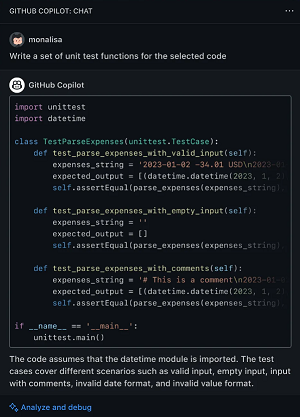News
Microsoft Offers Private Preview for GitHub Copilot Chat for Visual Studio 2022
Developers can now sign up for a private preview of enhanced chat capabilities coming to GitHub Copilot, the "AI pair programmer" that works in the Visual Studio 2022 IDE and in Visual Studio Code.
Since its 2021 introduction, Microsoft and Microsoft-owned GitHub have been evolving the Copilot extension beyond code-completion capabilities to take advantage of new breakthroughs like natural language processing (NLP) tech that powers the sentient-sounding ChatGPT chat bot from Microsoft partner OpenAI and newer large language models (LLMs) like OpenAI's GPT-4.
"This is no ordinary chat!" said Microsoft's Mark Wilson-Thomas, principal program manager for Visual Studio IntelliCode, in a March 22 post. "With tight integration in Visual Studio, it understands what you're working on. That means it can quickly help you get in-depth analysis and explanations of how a code block works, generate unit tests, and even find and get proposed fixes to bugs, or explain exceptions."
 [Click on image for larger view.] GitHub Copilot Chat (source: GitHub).
[Click on image for larger view.] GitHub Copilot Chat (source: GitHub).
Developers are invited to join the waitlist for a private beta preview of the new chat functionality.
Said functionality was also detailed in a March 22 post from GitHub about Copilot X, which noted the tool was evolving to also provide voice interfaces, support pull requests, answer questions on docs, and adopt GPT-4 for a more personalized developer experience.
"We are bringing a chat interface to the editor that's focused on developer scenarios and natively integrates with VS Code and Visual Studio," said Thomas Dohmke. "This does far more than suggest code. GitHub Copilot Chat is not just a chat window. It recognizes what code a developer has typed, what error messages are shown, and it's deeply embedded into the IDE."
Dohmke also invited developers to apply for technical preview of other functionality for pull requests and documentation (see the Visual Studio Magazine article, "New, Advanced GPT-4 AI Model Comes to GitHub Copilot, Azure OpenAI Service)."
Coincidentally, the new Visual Studio functionality on tap was previewed by Microsoft's Mads Kristensen at this week's Visual Studio Live! conference in Las Vegas. The principal product manager for Visual Studio used his inside insights into the dev team's work to discuss in a conference keynote presentation how AI could revolutionize tasks in five general areas: writing code; debugging; profiling; explaining code; and providing a starting point for projects (see the article, "Mads Kristensen's Sneak Peek at Visual Studio's AI Future, To 'Rekindle Our Love of Coding'").
About the Author
David Ramel is an editor and writer at Converge 360.